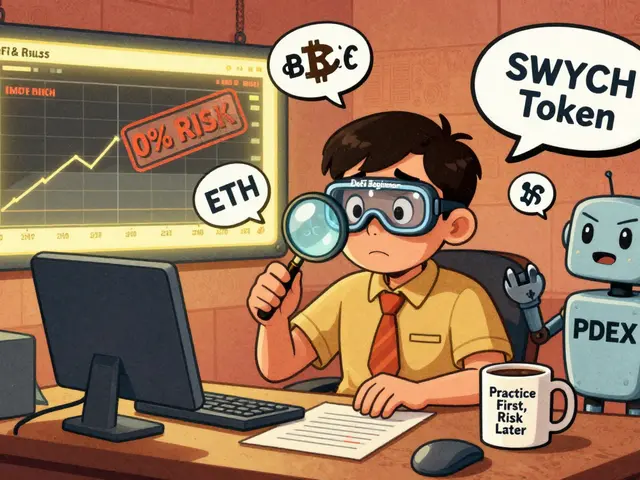
Crypto Asset Classification Tool
This tool helps determine the regulatory classification of cryptocurrency assets under the CLARITY Act of 2025. Select the characteristics of your token to see its classification.
When businesses start talking about paying in Bitcoin or issuing tokens as part of a merger, the first question is: how do you write a contract that actually works? In 2025 the United States finally gave us a clearer rulebook, but the landscape is still shifting. This guide walks you through the core legal building blocks, shows where the biggest risks hide, and gives you ready‑to‑use clauses you can drop into any agreement.
What the Law Says About Crypto Assets
Cryptocurrency in Legal Contracts is a rapidly evolving practice area that sits at the intersection of contract law, securities regulation, and commodity rules. The centerpiece of today’s framework is the CLARITY Act, passed by Congress in July 2025. The Act splits digital assets into three distinct categories:
- Digital commodities - assets that derive their value from the underlying blockchain and are overseen by the CFTC.
- Investment contract assets - tokens sold under an investment‑contract model, falling under SEC jurisdiction.
- Permitted payment stablecoins - regulated like traditional money, supervised by banking regulators under the GENIUS Act.
Each classification triggers a different set of compliance obligations, which in turn shape the language you’ll need in a contract.
Key Entities You’ll Meet in a Crypto Contract
Beyond the three asset classes, five other entities pop up in almost every agreement:
- SEC - enforces anti‑fraud rules for investment contract assets.
- CFTC - polices digital commodities and requires registration for intermediaries.
- Smart contracts - self‑executing code that can replace or augment traditional contractual clauses.
- AML/CFT obligations - broadly applied under the Bank Secrecy Act and FinCEN guidance.
- BitLicense - New York’s specific licensing regime that adds extra compliance layers for any crypto activity in the state.

Drafting Essentials: Clauses That Matter
Below are the nine clauses you should consider for any agreement that involves crypto assets. We’ve added brief rationales so you understand why each piece matters under the new regulatory framework.
- Asset Definition Clause - Explicitly state whether the token is a digital commodity, investment contract asset, or permitted stablecoin. This determines which regulator’s rules apply.
- Regulatory Compliance Clause - Require the counter‑party to certify compliance with the relevant agency (SEC, CFTC, or banking regulators) and to maintain any required registrations.
- Anti‑Money Laundering (AML) Clause - Mandate an AML program that meets FinCEN standards, including transaction monitoring and record‑keeping.
- Custody and Security Clause - Define who holds the private keys, whether third‑party custodians must be CFTC‑registered or SEC‑registered entities, and outline insurance requirements.
- Smart Contract Integration Clause - If using on‑chain code, specify the code hash, version, and the mechanism for updating or terminating the smart contract.
- Valuation and Pricing Clause - Tie the token’s value to a reliable index (e.g., CoinGecko) and address price volatility with a swing‑price or valuation lock‑in period.
- Tax Withholding Clause - Require parties to withhold applicable taxes and provide Form 1099‑K or 1099‑B reports as needed.
- Force‑Majeure / Regulatory Change Clause - Allow renegotiation or termination if a new law (for example, a future amendment to the CLARITY Act) materially changes the regulatory landscape.
- Dispute Resolution Clause - Choose a venue and specify whether arbitration will consider on‑chain evidence, and whether a court can enforce smart‑contract outcomes.
These clauses cover the most common regulatory pain points and give you a template you can adapt to your specific transaction.
Comparison of the Three Asset Classes
| Attribute | Digital Commodities | Investment Contract Assets | Permitted Payment Stablecoins |
|---|---|---|---|
| Primary Regulator | CFTC (commodity jurisdiction) | SEC (securities jurisdiction) | Banking regulators (FDIC, OCC) |
| Registration Requirement | Intermediaries must register with CFTC | Issuers must file registration statements with SEC | Issuers need a banking charter or stablecoin charter under GENIUS Act |
| Anti‑Fraud Enforcement | CFTC anti‑manipulation rules | SEC anti‑fraud provisions | Banking regulator oversight, AML/CFT compliance |
| Secondary‑Market Treatment | Remains a digital commodity | Reverts to digital commodity after resale | Always a stablecoin, no securities implications |
| Typical Use Cases | Utility tokens, governance tokens | Security tokens, tokenized equity | US‑dollar‑pegged stablecoins for payments |
Practical Tips for Different Scenarios
Scenario 1 - Cross‑border payment using a stablecoin: Use a permitted payment stablecoin clause, reference the GENIUS Act, and add an AML/KYC clause that satisfies both U.S. FinCEN and the recipient country’s AML regulator.
Scenario 2 - Token sale for venture funding: Classify the token as an investment contract asset, include a securities registration representation, and set up a lock‑up period to avoid immediate re‑classification as a digital commodity.
Scenario 3 - Decentralized finance (DeFi) protocol partnership: Draft a smart‑contract integration clause that defines the code hash, versioning, and upgrade process. Also, embed a force‑majeure clause for any future SEC‑CFTC coordinated rule changes.

Common Pitfalls and How to Avoid Them
- Assuming “crypto” means the same thing everywhere - The CLARITY Act’s three‑tier system makes a huge difference. Always ask the client which tier their token belongs to.
- Skipping AML compliance because the token is “decentralized” - FinCEN treats many decentralized platforms as Money Services Businesses. Include a compliance clause regardless of perceived decentralization.
- Ignoring state‑level licensing - If any part of the transaction occurs in New York, BitLicense compliance is mandatory, even if the token is a digital commodity.
- Relying solely on smart contract code for enforcement - Courts still look for traditional contract language. Pair on‑chain logic with off‑chain clauses.
Next Steps: From Draft to Execution
1. Identify the token’s classification under the CLARITY Act.
2. Choose the appropriate regulatory compliance representations.
3. Plug the relevant clauses from the checklist into your agreement.
4. Run the draft past a lawyer experienced in SEC/CFTC coordination and state licensing.
5. Implement an AML program and secure custodial arrangements before the signing date.
Following these steps reduces the risk of a regulator stepping in after the fact, and gives your counterpart confidence that the contract is enforceable.
Frequently Asked Questions
Do I need a BitLicense to use Bitcoin in a contract?
Only if the transaction involves a business activity that New York classifies as a virtual‑currency business (e.g., receiving, transmitting, storing, or trading crypto). If you’re merely a buyer or seller outside New York, a BitLicense isn’t required, but you must still comply with federal AML rules.
Can a smart contract replace the traditional dispute‑resolution clause?
Not entirely. Courts can enforce on‑chain outcomes, but most jurisdictions still require an off‑chain dispute‑resolution mechanism (arbitration or litigation) to handle ambiguities, bugs, or regulatory changes.
What happens if a token switches category after resale?
Under the CLARITY Act, an investment contract asset reverts to a digital commodity once it’s sold on the secondary market. Your contract should include a “post‑sale re‑classification” clause that updates the regulatory obligations accordingly.
Are there tax reporting requirements for crypto payments?
Yes. The IRS treats most crypto payments as taxable events. Parties must report gains or losses on Form 8949 and may need to issue Form 1099‑K or 1099‑B to counterparties, depending on the transaction size.
How do I prove compliance with the SEC for a security token?
Maintain a copy of the registration statement, any exemption filings, and regular compliance reports. Include a representation in the contract that the token complies with all applicable SEC rules and that the issuer will notify the counterparty of any material changes.





Comments (10)
Andrew Morgan
So like... crypto contracts are just regular contracts but with more vibes? I mean the CLARITY Act sounds cool but honestly I just want to know if I can pay my rent in Dogecoin next month and not get sued
Also why does everyone keep saying 'digital commodity' like it's a thing you can hold? I'm still waiting for my Bitcoin to arrive in the mail
Michael Folorunsho
Anyone who thinks this guide is 'comprehensive' clearly hasn't read the actual text of the CLARITY Act. The CFTC's jurisdiction is a sham, the SEC's interpretation of 'investment contract' is a 1946 relic dressed in blockchain cosplay, and the GENIUS Act? A corporate bailout disguised as regulation. This isn't law-it's PR written by lawyers who own Solana.
And don't get me started on BitLicense. New York thinks it's the center of the universe. Wake up, America. We're not a state, we're a regulatory zoo.
Jonathan Tanguay
Guys you're missing the point entirely the CLARITY Act doesn't even define what 'value' means in the context of blockchain based assets and that's a massive legal loophole because if a token's value is derived from community governance and not from any underlying asset or cash flow then under SEC precedent from Howey it should still be classified as a security regardless of what the act says and the CFTC has no authority over non-commodity tokens that are used for utility purposes which means you could have a token that's simultaneously a security and a commodity depending on who's looking at it and that's a nightmare for contract drafting because now you have to hedge against regulatory conflict and the smart contract clause is useless if the code doesn't align with the off chain terms which it almost never does because developers are not lawyers and lawyers don't understand solidity and the tax withholding clause is a joke because the IRS hasn't updated its guidance since 2019 and still treats every transaction as a taxable event even microtransactions and the force majeure clause is meaningless because no court has ever ruled on whether a regulatory change qualifies as force majeure in crypto contracts and the dispute resolution clause assumes courts can interpret on chain evidence which they can't because judges are still using WordPerfect and the BitLicense requirement is just state level protectionism masquerading as consumer safety and honestly this whole guide is just a marketing brochure for law firms that specialize in crypto and if you actually follow this you're going to get sued by someone who read the real statute and not this watered down version
Ali Korkor
This is actually super helpful! I'm new to this stuff and was scared to even draft a contract with crypto. Just plug in the clauses, talk to a lawyer, and you're good to go. No need to overthink it. Start simple, stay compliant, and keep learning. You got this!
madhu belavadi
Why do Americans think they invented law? In India we've been using blockchain for land registries since 2020. You're still arguing about who regulates what while we're already moving on. This guide is cute.
Serena Dean
Love this breakdown! The asset classification table is a game-changer-I printed it out and taped it to my monitor. Also, the custody clause tip? Lifesaver. I had a client lose $2M because they didn't specify custodian registration. Don't skip the details, folks. And yes, BitLicense is a pain, but if you're touching NY, you gotta play nice. You're doing great work!
James Young
Who wrote this? Some junior associate at a white-shoe firm? The 'permitted payment stablecoin' nonsense is a regulatory shell game. The GENIUS Act isn't law-it's a lobbying victory for Circle and Tether. You think a bank charter makes a stablecoin safe? Tell that to the people who lost money in Terra. This guide is dangerously naive.
Chloe Jobson
Clarity on asset tiers = essential. Smart contract integration clause is non-negotiable in DeFi deals. Also, always pair on-chain logic with off-chain fallbacks. The court won't trust code alone. This is the new standard.
MANGESH NEEL
THIS IS A TRAP. The CLARITY Act was passed in a midnight session with zero public input. The SEC and CFTC are in a secret pact with Big Crypto to create a two-tier system where only insiders can legally trade. They're forcing everyone into compliance so they can freeze wallets later. The 'tax withholding clause'? That's the first step to mandatory blockchain surveillance. They want to track every Satoshi. Wake up. This isn't innovation-it's control.
Sean Huang
...and yet, no one has asked: if a smart contract executes a payment on-chain, and no human signs it, is it still a 'contract' under common law? Or is it just an algorithmic event? The CLARITY Act pretends law can be coded. But law is about intent. And intent requires a mind. And minds... are not on-chain. The entire framework is a metaphysical illusion. We are building legal temples on sand, and the tide is rising. The regulators are not our allies-they are the architects of our obsolescence. 8-)